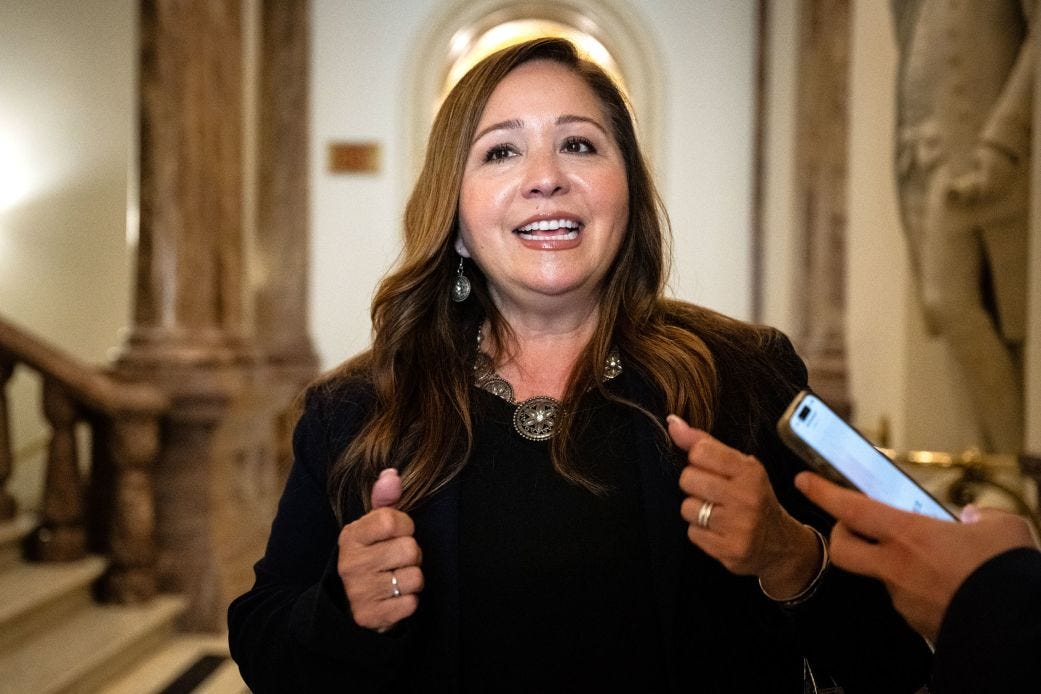On September 23rd, Adelita Grijalva was elected in a special election in Arizona’s 7th district. Usually, such elections go unnoticed by most political observers. In this case, Adelita won the seat after her late father, Representative Raul Grijalva, passed away in March.
But what galvanized national attention is that, despite being elected to Congress, she has not been sworn in yet as a lawmaker. Even though there is a government shutdown, there are no restrictions on House Speaker Mike Johnson to hold a swearing-in ceremony and allow Grijalva to serve as a member of Congress.
There are several reasons that Johnson might not want to swear in Grijalva, including the fact that it narrows the House GOP majority, which is already pretty narrow. Some have argued that the Epstein files may be one of the key reasons that Grijalva has not sworn in yet, given that she has openly supported being the crucial 218th vote that would force the government to release the Epstein files.
Democrats have questioned Johnson to his face on why he hasn’t sworn in Grijalva, while the House Speaker has publicly denied allegations that the Epstein files. As for flip-flops, Johnson first told CNN that “we’ll schedule it, I guess, as soon as she wants.” Days later, he said, “The House will come back into session and do its work as soon as Chuck Schumer allows us to reopen the government.”
Chances are, Grijalva would be sworn into Congress sooner or later. But Johnson’s delaying tactics, added with his decision to keep the House out of session that have pissed off some Republicans, leaving some concerns for how the legislative branch handles its power amid a Republican trifecta. Over the past few months, we have already seen Congress dispatching most of its checks and balances to the executive branch. For example, Congress has the power to impose tariffs on other countries, but Trump has been the one imposing unilateral tariffs on nations like China. Due to the Republicans’ near-complete fealty to Trump, the legislative branch has done very little to stop it.
With increasing authoritarianism encroaching on all aspects of American politics and society, the only aspect of democracy currently left untouched is free and fair elections.
There are numerous hypothetical ways that Trump can disrupt the 2026 midterm elections, including by dispatching National Guard troops to blue cities (Like he has done to Los Angeles and Washington, DC, and now with Chicago and Portland), or by activating the Insurrection Act (Which he has been mulling for days) to depress turnout ahead of the November vote next year.
But one thing he can do after the vote, which generally indicates a Democrat win in the House of Representatives and a narrow Republican win in the Senate, is to refuse to swear them in. As we have seen over the past ten years, most of the US political system is established on norms, which is something Trump has shown repeated disregard for.
More worryingly, there is nobody to stop him, and many who are willing to do his bidding for power and fealty. Given Johnson’s potential precedent of not swearing in Grijalva, he could refuse to swear in the newly elected Congressmen and women to the House. Alternatively, Johnson could keep the House out of session indefinitely. Regardless of the method, the House GOP can effectively stall Democrats from getting power while Trump implements his agenda.
Now, is that likely to happen? Between 1 to 10, I would say the possibility of my proposed scenario is between 2 to 3. But the fact that we are talking about this scenario should worry everyone, especially as American democracy is backsliding at an alarming rate.
We are now approaching the level where the foundations of free and fair elections, as well as a peaceful transfer of power, are questioned. American democracy can survive, but now it comes with an asterisk.


